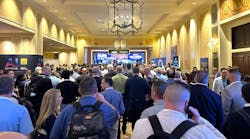Many security practitioners have been asking how to deal with the increasing pace of technology development. I have been asking around the industry to try to get a sense of the impact. The answers cover a spectrum that is too broad to address in a single column, so I’ll start with those that invalidated some of my previously successful practices.
Q: How has the pace of security technology development affected you?
A: When it comes to evaluating technology, it used to be that I could check with a few reference sites and see what kind of experience they had, and get a good idea of how it would work for my client in actual operations. These were usually simple and straightforward conversations. In the past, there was generally uniformity in the answers for a particular brand or product — either all the experiences were good to great, or they were mildly to significantly unsatisfactory. Now, I’m finding that’s not the case anymore. The same system can have good performance for some, and not for others. More recently, I have tried to find out why. After ruling out dissatisfaction due to overly high expectations, and known compromises for the sake of cost, there were still differences in product and system performance.
Sometimes the selected technology was (in my opinion) not the right recommendation for that particular end-user’s needs. Sometimes the technology was simply not configured properly, which would be a shortcoming of the integrator. Sometimes the end-users didn’t know how to use the product in the way they needed to, even though the functionality was there. I have also seen systems that when I observed them, looked great to me, yet the end-users said they preferred another system they saw at a similar facility (one that I don’t think is as good as what they have). My main conclusion is that it now requires a lot more homework to “get it right” than it used to, especially with the rapid pace of technology change.
— Veteran Security Technology Consultant
A: We now always pilot test any strategic technology, no matter what we see elsewhere. It has always turned out to be worth the cost. Many times we have saved some big missteps that would have occurred with our global deployments. They would have compromised our security performance, and lowered the credibility of our security team.
— Global Security Manager, IT Software and Services Company
In a very frank discussion of the capabilities of network video cameras, Fredrik Nilsson of Axis Communications explains on page 58 of his book, Intelligent Network Video: “To properly compare the low-light performance of two different cameras, it is necessary to look beyond the lux and IRE numbers. Putting two cameras side-by-side and comparing the outcome is recommended.”
When you are examining specific product performance very closely, the target environment can have a lot to do with the performance outcome, especially with cameras. Unless you can find an environment that is identical to yours, and is using the technology in exactly the same way, a pilot test is the surest way to guarantee that you get what you want. It is a small cost to guarantee that “what you see is what you get,” which is important when it comes to something as critical as security.
Continuing Question:
How has the pace of security technology development affected you?
If you have experience that relates to this question, or have other convergence experience you want to share, e-mail your answer to me at [email protected] or call me at 949-831-6788. If you have a question you would like answered, I’d like to see it. We don’t need to reveal your name or company name in the column. I look forward to hearing from you!
Ray Bernard, PSP, CHS-III is the principal consultant for Ray Bernard Consulting Services (RBCS), a firm that provides security consulting services for public and private facilities. Mr. Bernard has also provided pivotal strategic and technical advice in the security and building automation industries for more than 18 years. He is founder and publisher of The Security Minute 60-second newsletter (www.TheSecurityMinute.com). For more information about Ray Bernard and RBCS go to www.go-rbcs.com or call 949-831-6788.


